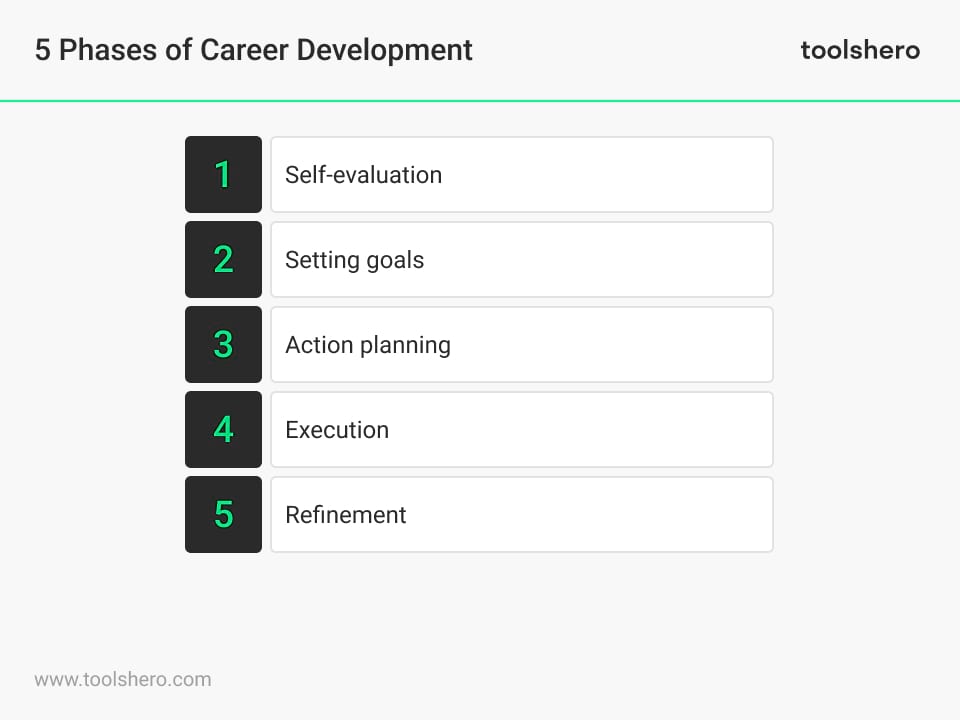Career development: this short article explains career development in a practical way. Next to what it is, this article also highlights how it works, what the different phases are, and tips. Enjoy reading!
Career development: this short article explains career development in a practical way. Next to what it is, this article also highlights how it works, what the different phases are, and tips. Enjoy reading!
Career development is a concept that raises questions among many people. Whether it comes up at the start of a career or when you are looking for a change, it remains a vague concept for some.
To better understand this concept, we have linked a list of related topics to this tag.
In general, this concept can be divided into five main steps:

Figure 1 – phases of career development
Career development is a conscious and continuous process to advance one’s professional career. It involves setting mid-term and long-term goals, exploring opportunities for development and gaining work experience. In today’s competitive work environment, it is helpful, if not crucial, to ‘keep up’.
Career development is something that is carried out by employees themselves, or under the guidance of the organization. Some organizations provide resources and processes such as development programs, while independent professionals seek out opportunities, events and conversations with advisors to advance themselves.
There are different types. In general, a distinction is made between formal and informal career development.
Formal career development includes training programs and certifications, while informal career development includes mentorship, networking, online courses and internships.
Whatever form of career development is involved, it comes down to the same thing: taking control in the process of self-development in the professional field. It is very important to understand yourself and clearly map out your interests. Education and further study is often necessary.
The first and crucial step in career development is self-assessment.
This is the time when you look inward, take a good look at yourself and identify your strengths, weaknesses, interests and goals.
Self-evaluation helps you to form a clear picture of who you are and what you want to achieve in your career.
During this process you ask yourself questions such as:
By taking an honest look at yourself and your working environment, you lay the foundation for goal-oriented career development.
It helps you understand where you stand and what steps you need to take to achieve your professional dreams.
After the self-evaluation, it is time to define your goals. This is the second crucial stage in career development.
Objectives form the basis for your career planning and help you determine your course.
When setting goals, it is important to make them specific, measurable, achievable, relevant and time-bound (SMART).
This means that you must clearly formulate what you want to achieve, how you will measure it, whether it is realistic, whether it is relevant to your career and what deadline you attach to it.
After setting goals, it’s time to create your action plan, the third important stage in career development. An action plan is the concrete roadmap that guides the employee in achieving career goals.
Start by identifying the steps you need to take to achieve your goals.
Make sure the action plan is realistic and in line with the objectives. Determine a timeline for each step, so you know when to take which action. Also pay attention to dependencies. Sometimes you have to complete a certain task first before you can start on a second task.
It is also important to identify potential obstacles and think about how to overcome them.
After drawing up the action plan, it is time to take action. This is the fourth crucial stage.
Execution is the moment when someone actually starts implementing the plan and taking steps to achieve his or her career goals.
This is the stage where discipline and dedication are essential.
Follow your action plan closely and stick to the deadlines you set. Be proactive and seize the opportunities that arise.
You may encounter challenges and obstacles during implementation, but it is important to remain resilient, calm and overcome any setbacks.
It is also It is wise to regularly evaluate your progress.
Are adjustments needed in your action plan? Have you gained new insights?
After executing your action plan, the fifth and final, but no less important, phase of career development begins: refinement.
Refinement means that the career path is evaluated, adjusted and refined to better achieve the goals and optimize growth.
During this phase it is essential to reflect on what you have achieved and what you have learned.
The feedback from others can be valuable here.
Seek advice and evaluations from colleagues, mentors or managers to gain a better and more in-depth understanding of your performance and how to develop further.
The articles linked to the career development tag discuss the various methods and techniques associated with developing one’s professional career. Are you missing any articles on certain topics or techniques? Let us know in the comments or fill out the contact form. We will then get back to you as soon as possible.